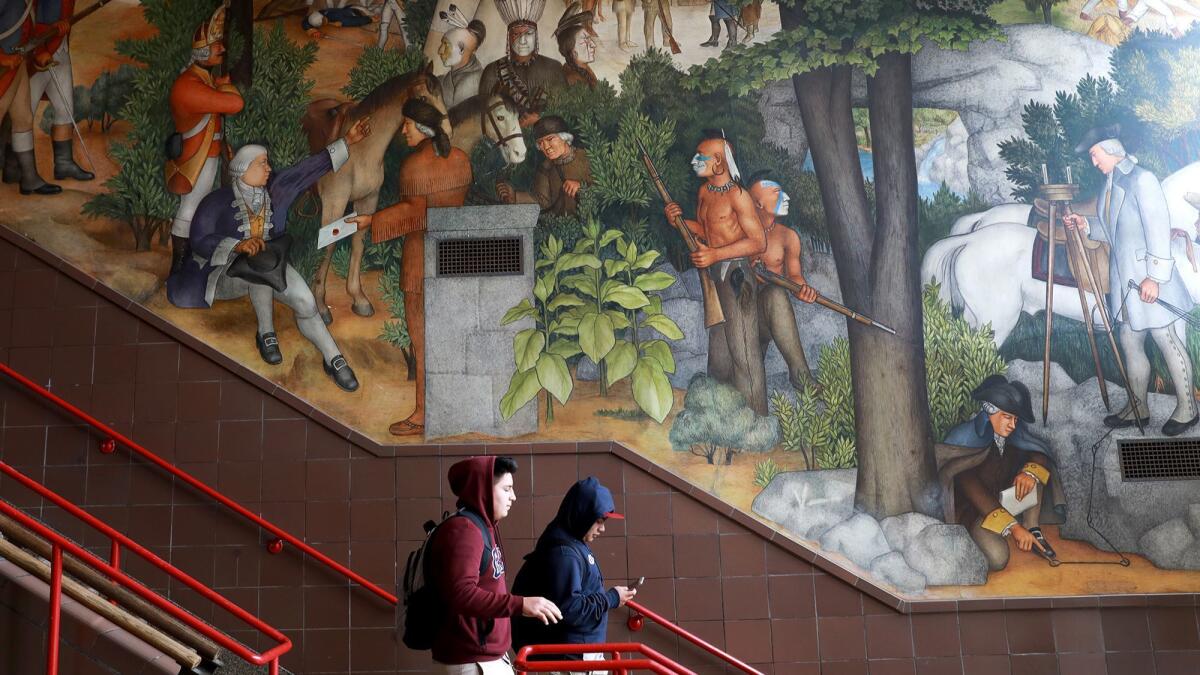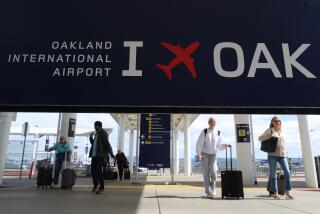San Francisco may rename 42 schools, including Lincoln High and Dianne Feinstein Elementary

The renaming committee began its presentation with an homage to the Ramaytush Ohlone people, whose homeland is now occupied by the city of San Francisco.
Then came the list of schools whose names the committee had flagged for removal because of alleged associations with slaveholding, colonization or oppression.
There were 42 in all — a third of San Francisco’s public schools.
Some of the schools’ namesakes, like California missionary Father Junipero Serra and “The Star-Spangled Banner” composer Francis Scott Key, have much-debated legacies.
For others, such as Abraham Lincoln and Sen. Dianne Feinstein, the reasons were less obvious.
The storied magnet school Lowell High was also on the list — its namesake, James Russell Lowell, was an abolitionist but depicted Black people unfavorably in his writings.
Committee members said school names should represent the school district’s values, which include respecting every person equally.
“The names of all the schools in this city should reflect people to be admired,” said Mary Travis Allen, a member of the renaming advisory committee.
But some graduates of the schools are up in arms about potentially changing the names of their alma maters. And the city’s mayor, London Breed, came out strongly against the timing of the renaming debate, describing it as an unwelcome distraction when schools are closed because of the COVID-19 pandemic.
“It’s offensive to parents who are juggling their children’s daily at-home learning schedules with doing their own jobs and maintaining their sanity,” Breed wrote in a news release last month. “It’s offensive to me as someone who went to our public schools, who loves our public schools, and who knows how those years in the classroom are what lifted me out of poverty and into college. It’s offensive to our kids who are staring at screens day after day instead of learning and growing with their classmates and friends.”
The renaming committee, which included parents, students, educators and community members, was convened by the San Francisco Unified School District’s board at the beginning of the year. On Nov. 10, the committee presented its recommendations to the board.
Whether the district will forge ahead with the name changes remains to be seen. The 42 schools have until Dec. 18 to suggest new names, which must be approved by the school board.
“Abraham Lincoln is not seen as much of a hero at all among many American Indian Nations and Native peoples of the United States, as the majority of his policies proved to be detrimental to them,” a committee member wrote on a spreadsheet summarizing the reasons for the renaming recommendations.
Feinstein, the long-serving U.S. senator and former San Francisco mayor, has an elementary school named after her.
The spreadsheet said of Feinstein: “Shes responsible for the eviction of a whole Pilipino neighboorhood, and the police brutaility, allowed police dogs to atack filipino veteran elders. She repeatly protected and flew the confederate flag in front of sf city hall.”
The eviction allegation was an apparent reference to the International Hotel, where 150 elderly Chinese and Filipino tenants were evicted in 1977, prior to the building’s demolition. Feinstein did not become mayor until the following year and had a hand in shaping the property’s redevelopment, according to a brochure from the hotel’s history committee.
According to the San Francisco Chronicle, a Confederate battle flag was flown in front of City Hall for several months in 1964, more than a decade before Feinstein’s mayoral tenure, as part of a “Pavilion of American Flags.” A different version of the Confederate flag may have persisted on a city flagpole, the Chronicle reported.
Tom Mentzer, a Feinstein spokesman, noted that the International Hotel evictions happened before Feinstein was mayor.
He added: “The school district is free to take whatever action it deems necessary, but it’s important to know the flag, part of a design installed years before Sen. Feinstein was a supervisor or mayor, came down during her tenure as mayor.”
At the Nov. 10 meeting, some spoke in favor of the renaming efforts.
“I feel like this is something that allows school communities to focus on reinventing themselves and think about who have we not been uplifting, who have we not been celebrating?” said school board Commissioner Alison Collins.
Joan Hepperly, co-executive director for United Administrators of San Francisco, said the union supports the renamings but wants to slow down the process to ensure that it is inclusive, especially during a pandemic when families are struggling with online education.
“A rushed process would distort what we would hope to be a unifying and transformative experience into one that instead excludes members of our communities who are most marginalized,” Hepperly said.
Others are opposed to renaming the schools, including a group of alumni associations that has launched a letter-writing campaign.
“What a waste of valuable resources — better spent to enhance education for our students,” read a statement on the Balboa High School Alumni Assn.’s website. “We truly believe that if this name change (God forbid) goes through, much/most of Bal’s history and traditions that have created our fabulous school spirit would be lost.”
Emily Sanchez Powell, 91, graduated from Balboa High in 1946 and was president of its alumni association for 45 years.
“Alums love their school, and there is this connection with the name. It ties us together, and we’d like to carry this forth with the current generation,” she said. “With the proposed renaming, to me, it’s also kind of causing a division. We don’t need another division in our life.”
Of the school’s namesake, Vasco Núñez de Balboa, the committee’s spreadsheet had this to say: “Balboa, a Spanish explorer, killed hundreds of Indigenous people.”
More to Read
Sign up for Essential California
The most important California stories and recommendations in your inbox every morning.
You may occasionally receive promotional content from the Los Angeles Times.











